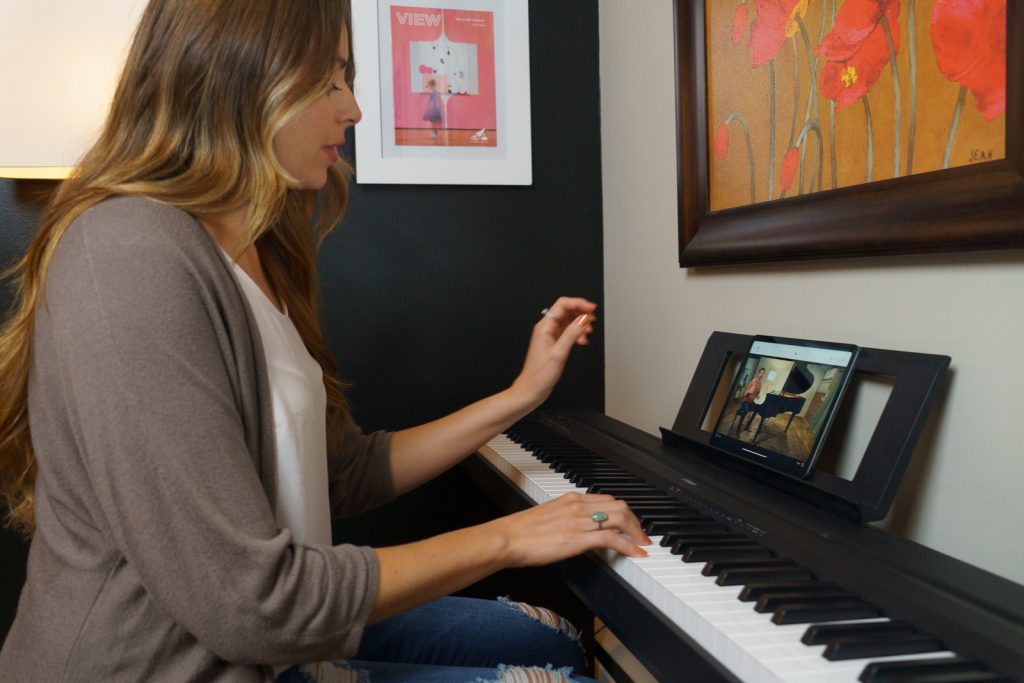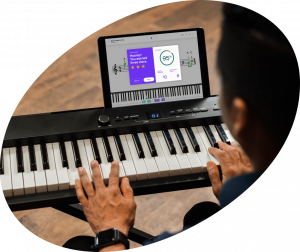The importance of piano practice
Like with all things in life (and especially with piano), practice makes perfect! One of the biggest mistakes that beginners make when learning piano, is not creating any structure for their piano practice. You need a consistent routine and some clear, achievable goals. But practice shouldn’t be a chore: the more you enjoy practicing, the more likely you are to get better. The purpose of this chapter is to provide you with a strong practice method that will help you improve and, most importantly, have fun.
Tips on how to practice piano
How can you get better at the piano, while also cultivating a healthy, positive musical attitude? Here are some general tips:
- Commit to a practice schedule. Write it down, and do your best to stick with it. It’s important to have a consistent routine, so that your piano practice is stable, reliable, and positive, even when life is chaotic. Whatever commitment you can make is better than nothing. If you have only a few minutes to practice a few times a week, that’s great. Think of it like physical exercise in this regard.
- Set some concrete goals. Write them down. Why do you want to learn the piano, anyway? Is there a particular song you want to learn? Do you want to play something in front of your friends? Your musical goals don’t need to be ambitious: in fact, it’s more helpful to set small, simple goals that feel like they’re within your reach. The point is to motivate you, not stress you out.
- Make it fun with piano learning software. With a piano learning app, you can learn by playing your favorite songs in a stimulating interactive environment. If the software has backing tracks, you’ll feel like you’re part of a band as you play along with the music. And if you’re naturally competitive, keeping an eye on your scores will motivate you to keep up the good work.

Remember that you’re doing this because you love music! It can be easy to beat yourself up because you’re not progressing as fast as you want. Instead, take a deep breath and pat yourself on the back for doing the best you can, and for developing a beautiful skill.
In terms of a specific practice routine, it’s important to experiment, to figure out what’s effective and enjoyable for you. Here are a couple things to try out:
- Warming up: some musicians like to jump straight in to practicing songs and pieces, without spending much time on learning piano basics, like technical exercises such as scales and arpeggios. For others, a physical and mental warm-up helps set the right tone for music practice. Try it both ways and see which you prefer.
- Breaking down the music: this includes practicing slowly or hands apart, breaking songs into segments, etc. Again, some musicians find it helpful to slow the music down, while others want to focus their energy on playing at the full tempo. The same can be said for practicing each hand separately, or practicing one section at a time. Breaking the music down is generally helpful, but there’s a balance to strike between simplifying musical challenges and building up your concentration and endurance.
How to play Hanon piano exercises
One popular source of warm-up exercises is Hanon’s “The Virtuoso Pianist.” This is a collection of technical exercises designed to develop finger dexterity and evenness of touch. Some pianists believe that the exercises are essential, while others argue that they can be harmful.
We believe that there’s no harm in practicing piano technique on its own. If you’re interested in the Hanon exercises, give them a shot: it can be fun to try to play them at full speed. But remember that exercises are just exercises! When beginning piano, don’t spend all of your precious practice time on them. Maybe there are some professional musicians out there who decided to pursue music because of their love of Hanon, but we haven’t met them yet!
What should you practice?
Of course, it’s important to play real music in some form, not just exercises! Besides, playing piano songs and pieces is more fun and satisfying than spending hours and hours on scales and Hanon. As a rule of thumb, you should be spending at least two-thirds of your practice time on genuine songs or pieces of music, appropriate to your skill level. We recommend starting with these must-learn piano songs for beginners.
How exactly should you structure that practice? Here are some ideas:
- Break down the music, in the ways discussed above.
- Train your ears: listen carefully to recordings and try to sing or play along with them.
- Train your inner ear: imagine the sound of the music in your head, possibly using the sheet music as a guide.
- Practice performing: imagine that you’re playing in front of an audience. Can you make it through the music without stopping?
Each of these ways of practicing has its own challenges. Working on all of them will make you a well-rounded and happy musician.
Can you over-practice piano?
Playing the piano is a physical and mental activity, and you should listen to your mind and body to tell you how much is enough. You should be physically comfortable whenever you practice. If your hands hurt after playing, that’s a sign that you’re practicing too much, or that you’re doing something physically unsustainable (maybe pressing down the keys too hard). You should also be mentally comfortable, meaning not so narrowly focused that you’ve become obsessive or distracted. Some people can play in an easy, relaxed way for hours, but it’s wise to schedule a short break every half hour, to check in with yourself. You can always stop for the day and come back tomorrow!
How long should you practice piano?
Most of us have non-musical jobs and other responsibilities, so it’s unrealistic to imagine that we can set aside hours and hours to practice every day, even if we want to. As addressed above, our minds and bodies have their own limitations as well. All of this is perfectly fine. The “ideal” practice time is whatever feels healthy, sustainable, and satisfying for you. If you have 4 hours a day to practice, and you love every minute of it, go for it, but if you have just 5 or 10 minutes a few times a week, that’s great too! It all counts.
How to improve piano practice
Finally, here are a couple tips for making practice more effective and rewarding:
- Mix up your practice routine. Be open to types of practice that are difficult or unfamiliar. Try new and different pieces of music.
- Give yourself a lot of credit for your successes: for the ways you’re challenging yourself, for the many things you’re learning, for the music you’re making.
Thanks for reading, and happy practicing!
